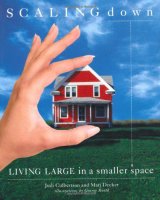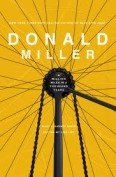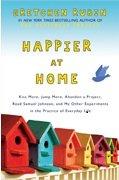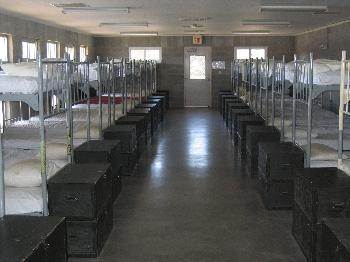 Scaling Down: Living Large in a Smaller Space by Judi Culbertson and Marj Decker (Rodale, 2005)
Scaling Down: Living Large in a Smaller Space by Judi Culbertson and Marj Decker (Rodale, 2005)
Prepare NOW; don't let the headache of dealing with your estate be your children's last, vivid, and painful memory of their parents.
A good friend has recently been embroiled in our generation's nightmare: moving her widowed mother out of her house-of-many-years and into assisted living, then having to clear out the house and sell it. (Thank you, Dad, for having made the process as easy as it gets, and to all my siblings for staying friends and even having some fun through it all.) Scaling Down is one of two books she recommended; it was available in our library, so I decided to check it out.
I wasn't expecting much, having already dealt with that heart- and headache. And if you're like me, you'll almost give up in the first chapter, where you're asked to write a "mission statement." But hang in there; the book's about a lot more than selling the old homestead, and you can easily ignore the annoying bits. Anyone who is merging two households, moving into a smaller space—or moving, period—fending off sibling rivalry over Grandpa's Kitchenaid mixer, or simply feeling overwhelmed by "stuff," can benefit from the book's suggestions.
One thing that differentiates Scaling Down from other decluttering books is the authors' sympathy for the emotional complications attached to our belongings. Although they are very practical and sometimes in my judgement a little too harsh in their methods, they do provide some helpful ideas for keeping the feeling and/or memory without keeping everything. Collectors, for example, are not asked to give up their collections, but to be wiser in their collecting: financing quality by selling off quantity.
The chapter headings:
- How Did We Get Here?
- I Need to Do This But...
- But Aunt Winnie Gave It to Me!
- Collaring the Paper Tiger
- The Tyranny of Collections
- The Secret Live of Clothing
- Clearing Out Your Family Home
- Your Cuisinart or Mine?
- Moving in a Hurry
- The Saga of the Rain Bonnets
- Finding Good Homes [for your stuff]
- "This is Your Life!"
- Shop Till You Drop ... Out
- How to Keep from Cluttering Your New Place
- Starting a New Adventure
- Using Your Space for You
Did you catch "How to Keep from Cluttering Your New Place"? I know from painful experience that without the exercise of an iron will, bigger refrigerators, bigger closets, and bigger homes all soon become just as crowded as the smaller counterparts they replaced.
Another surprising, but potentially life-changing idea is expressed by the last chapter: Using your space for you. Actually, it's a major theme throughout the book: You stuff, from clothes to cupboards to collectibles, should be what pleases you, what makes you feel comfortable and happy, what works for the vision you have of what your home should be. Quantity rarely provides that, but we keep buying things for all the wrong reasons, having never taken the time and effort to discover what we really like. I suppose that seems obvious, but there are a lot of things I keep for no reason other than that I have them, and they work. We still have the kitchen wallpaper that was there when we moved in, even though I'd never have chosen it out of a wallpaper book. I don't think that's all bad—and I still dread the idea of even looking through a wallpaper book, let alone tearing up my kitchen—but the authors do have a point. And I do like their answer to this objection:
"I don't want to make any changes that would hurt my home's resale value."
This statement strikes us as sad. It is similar to someone buying a new car, then saying, "I'm only going to drive it when my other car is in the shop, because I want to keep the mileage low for the trade-in." That attitude makes you the caretaker of the property, keeping it nice for some future owner, instead of behaving like it's yours. If you've always dreamed of a vaulted-ceiling library, and your garage is the perfect place to create one, why not do so? You'll have years of pleasure, and if you or your heirs get a little less because it's too nice to park a car in, your satisfaction is worth the difference. Most of the time individualizing a space actually adds to the selling price. But even if it doesn't, don't sell yourself short.
I won't be buying the book, at least not yet. But I'll keep it in the back of my mind, and might get it out again when I need to be re-inspired. Not only is an organized, uncluttered home one of the best legacies we can leave our heirs, it also makes life a lot nicer in the meantime.
Posted by
sursumcorda on
Wednesday, October 10, 2012 at
6:53 am
|
Edit
Permalink |
Read 2520 times
|
Comments
(2)
Category
Reviews:
[first]
[previous]
[next]
[newest]
Children & Family Issues:
[first]
[previous]
[next]
[newest]

 A Million Miles in a Thousand Years: What I Learned by Editing My Life by Donald Miller (Thomas Nelson, 2009)
A Million Miles in a Thousand Years: What I Learned by Editing My Life by Donald Miller (Thomas Nelson, 2009) Happier at Home: Kiss More, Jump More, Abandon a Project, Read Samuel Johnson, and My Other Experiments in the Practice of Everyday Life by Gretchen Rubin (Crown Archetype, 2012)
Happier at Home: Kiss More, Jump More, Abandon a Project, Read Samuel Johnson, and My Other Experiments in the Practice of Everyday Life by Gretchen Rubin (Crown Archetype, 2012) Scaling Down: Living Large in a Smaller Space by Judi Culbertson and Marj Decker (Rodale, 2005)
Scaling Down: Living Large in a Smaller Space by Judi Culbertson and Marj Decker (Rodale, 2005)
 or
or  ?
?

